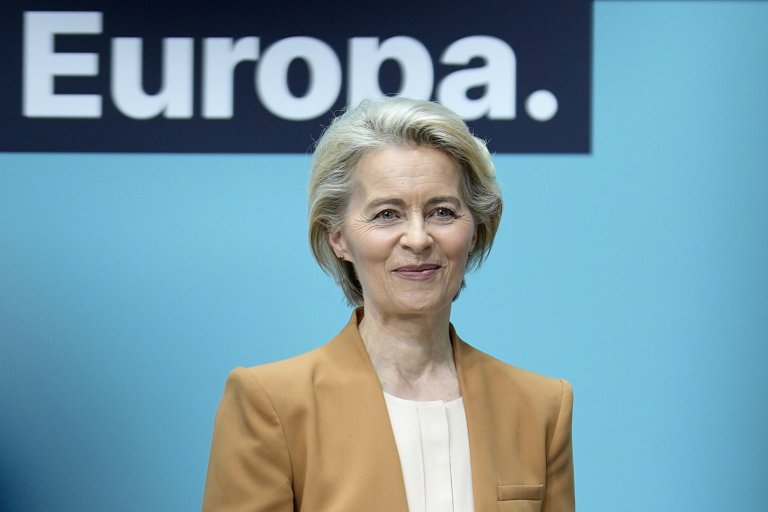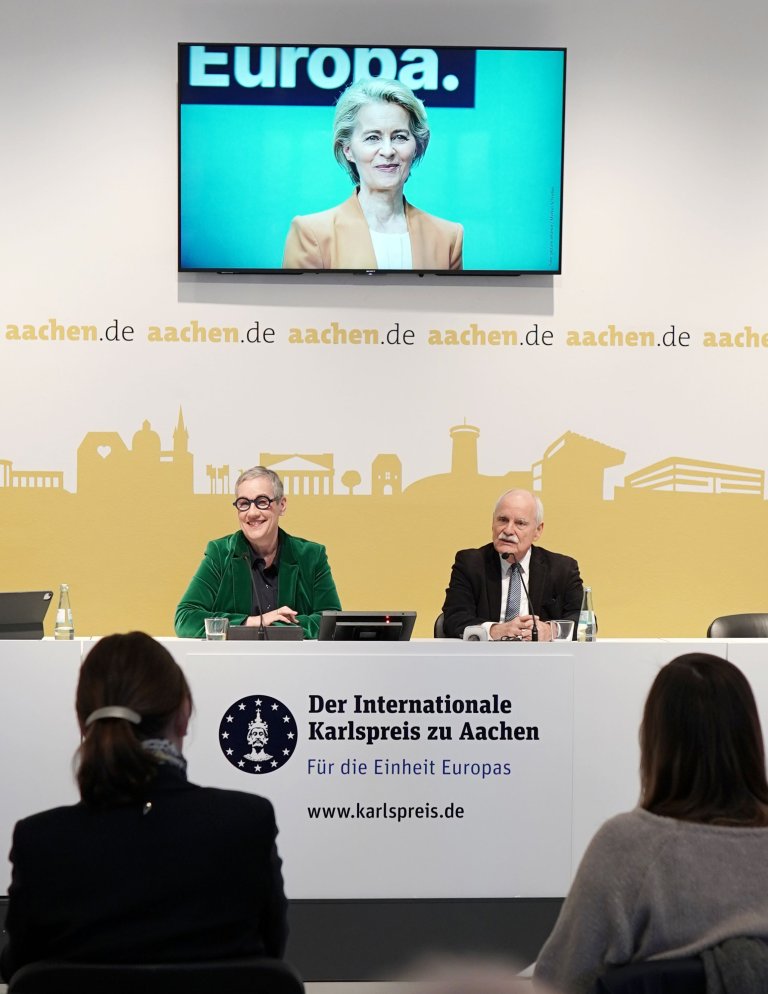The Charlemagne Prize 2025 goes to the President of the European Commission Dr. Ursula von der Leyen
- With this award, the Charlemagne Prize Board of Directors honors "an outstanding leader of the United Europe, who leads the Union through a time of profound transformations with vision, courage, determination and foresight."
- In its statement, the Charlemagne Prize Board of Directors said that it wanted to "encourage and strengthen Ursula von der Leyen with the award to represent the EU as a significant force in the global political world".
- The Charlemagne Prize will be awarded on Ascension Day, May 29, 2025, in the Coronation Hall of Aachen City Hall.
Dr. Ursula von der Leyen, President of the European Commission, will receive the Charlemagne Prize of Aachen in 2025. This was announced by the Chairman of the Board of Directors of the Society for the Conferring of the International Charlemagne Prize of Aachen, Dr. Jürgen Linden, and the Mayor of Aachen, Sibylle Keupen, today (January 15, 2025) in Aachen.
"The decision in favour of Ursula von der Leyen was unanimous in the Board of Directors," opened Dr. Jürgen Linden. "For us, the President of the European Commission is the face of Europe in the world. She is the communication hub for all political challenges and problems that arise in Europe - and for Europe - vis-à-vis the world," emphasized Dr. Linden.
Encouragement
In its citation, the Charlemagne Prize Board of Directors added that it wanted to encourage and strengthen Ursula von der Leyen with the award "to represent the EU as a significant force in the global political world, to lead it as a peacemaking, democratizing and partnership-based power, to strengthen Europe as a society of values and, through improved competitiveness, to ensure that the great peace project of Europe can also keep its promise of economic and social well-being for its citizens".
Strength and diplomatic skills
Lord Mayor Sibylle Keupen also emphasized that a strong Europe is essential at the moment. Ursula von der Leyen embodies this strength that Europe needs now like no other. She is a personality who has stood for Europe for years and is committed to uniting Europe internally with all her strength and diplomatic skills. She explained: "In view of the shift to the right in Europe and the USA, it is particularly important now to strengthen the European institutions. As President of the European Commission, Ursula von der Leyen has succeeded in uniting the European Union. She is the face of the EU and stands for stability and continuity."
Curriculum vitae
Ursula von der Leyen was born in Brussels in 1958, where her father, the future Minister President of Lower Saxony, Ernst Albrecht, was working at the time as Head of Cabinet for the German EEC Commissioner Hans von der Groeben. After graduating from high school, she first studied archaeology and economics before opting for medicine in 1980.
A member of the CDU since 1990, she switched to politics as a "lateral entrant", gaining a seat in the Lower Saxony state parliament in 2003 and being appointed by Minister President Christian Wulff as Minister for Social Affairs, Women, Family and Health in his first cabinet. In 2005, she moved into federal politics as Federal Minister for Family Affairs, Senior Citizens, Women and Youth; in 2009, she took over the Federal Ministry of Labor and Social Affairs. In 2013, she became the first woman to be appointed Minister of Defense and was confirmed in this office four years later. On 2 July 2019, Ursula von der Leyen was nominated for the post of Commission President.
In awarding the Charlemagne Prize 2025 to the Commission President, the Executive Board emphasizes "that Ursula von der Leyen and the Commission under her leadership have played a decisive role in ensuring that the EU has faced crises of epochal proportions with unity and success". Ursula von der Leyen is aware that transatlantic cohesion is necessary for Europe's economic security. Following changes in the political structures in the United States, this now required a special strategic effort on the part of Europeans. The most important prerequisite for this was the unity of the members. She fights for this unity like no other.
Leader of the United Europe
The explanatory statement finally reads: "With the President of the European Commission, Dr. Ursula von der Leyen, the Board of Directors of the Society for the Conferring of the International Charlemagne Prize of Aachen 2025 in the year of its 75th anniversary honors an outstanding leader of the United Europe, who leads the Union through a time of profound transformations with vision, courage, determination and foresight."
A celebration of Europe
This year, the Charlemagne Prize will once again traditionally be awarded on Ascension Day, 29 May. Jürgen Linden reported that Ursula von der Leyen was delighted to receive the award and had already firmly scheduled the Charlemagne Prize ceremony in her diary. He promised: "We will turn the award ceremony into a strong Charlemagne Prize that will make the impetus we want to provide visible to the outside world." Mayor Keupen announced that, in addition to the official ceremony in the Coronation Hall of Aachen City Hall, the award day would be celebrated as a European festival with Aacheners and guests:
"open, lively and diverse".
Information on the Charlemagne Prize
The International Charlemagne Prize of Aachen is considered one of the most important European prizes. It has been awarded since 1950 to individuals and institutions who have rendered outstanding services to the unification of Europe. Previous winners include Konrad Adenauer (1954), King Juan Carlos I of Spain (1982), Francois Mitterand and Helmut Kohl (1988), Václav Havel (1991), US President Bill Clinton (2000), Luxembourg Prime Minister Jean-Claude Juncker (2006), German Chancellor Angela Merkel (2008), Pope Francis (2016), French President Emmanuel Macron (2018) and UN Secretary-General António Guterres (2019).
In 2022, the Belarusian civil rights activists Maria Kalesnikava, Svetlana Tikhanovskaya and Veronica Tsepkalo were awarded the prize, in 2023 the Ukrainian President Volodymyr Selensky and the Ukrainian people and in 2024 Chief Rabbi Pinchas Goldschmidt and the Jewish communities in Europe. In March 2004, Pope John Paul II received an extraordinary Charlemagne Prize, which was awarded in Rome.
Certificate and medal
In addition to a certificate, a medal is also awarded, which features the oldest Aachen city seal from the 12th century with Charlemagne enthroned on the front. On the front is the oldest Aachen city seal from the 12th century with Charlemagne enthroned and on the back an inscription for the respective prizewinner.
Explanatory statement
In this press release you will find the official explanatory statement of the Charlemagne Prize Board for the designated prizewinner Ursula von der Leyen as an attachment.
More information: www.aachen.de/karlspreis and www.karlspreis.de
You can subscribe to our RSS feed for our press releases here https://www.aachen.de/rss-feed-pressemitteilungen/rss.xml

